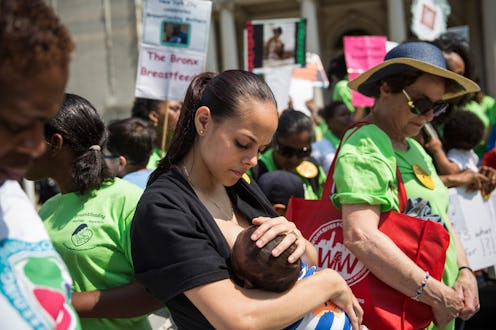
Despite being the best form of nutrition for infants, breastfeeding can be a controversial topic in many cultures. In recent years, more and more women globally have come to recognize the importance of breastfeeding, but unfortunately, its increasing popularity highlights how difficult it is for women to get adequate resources to breastfeed safely and comfortably. A new report released on Tuesday from the World Health Organization (WHO) and UNICEF found that not one country follows their breastfeeding guidelines, showing just how difficult it is for women who choose to breastfeed to do so.
WHO and UNICEF, along with the greater medical community, recommend that infants start nursing within the first hour of birth; consume only breastmilk for the first six months; and continue breastfeeding (in addition to adding age-appropriate foods) for the first two years of life. A report from these organizations calls breastfeeding "one of the most effective investments a country can make."
Breastfeeding is one of the most effective investments a country can make to ensure a smarter, healthier population. It protects children from a myriad of illnesses, increases IQ, and promotes a strong bond between mother and infant. It is a powerful practice, and one that has huge implications for a country's future prosperity.
The evaluation, which tracked data reported by each country, found that less than 44 percent of countries reported that mothers nursed within the first hour of birth. Only 23 countries, out of 194 total, had greater than 60 percent rates of breastfeeding exclusively until 6 months. Overall, not a single country reported a 100 percent rate of compliance with the recommendations (an interactive map created as part of the report allows you to see how the data breaks down, country by country).
Not surprisingly, the United States received "several red lights" in the report, as Laurence Grummer-Strawn, technical officer at the WHO, told USA Today. Only 24 percent of American mothers reported breastfeeding exclusively for the first six months, and there was no data to show if they continued breastfeeding for the full two years. Paid maternity leave, proven to increase the likelihood of breastfeeding as recommended, continues to not be guaranteed, and there was no data to demonstrate legal protections for nursing moms in the workplace.
The report recommends that countries invest $4.70 per newborn (almost $6 billion) in initiatives designed to improve breastfeeding rates, with the goal of getting at least 50 percent of mothers to breastfeed exclusively for the first 6 months by 2025.
Maybe by then, at least one country will be able to provide mothers with the support they need to make the choice they feel is right for their child.